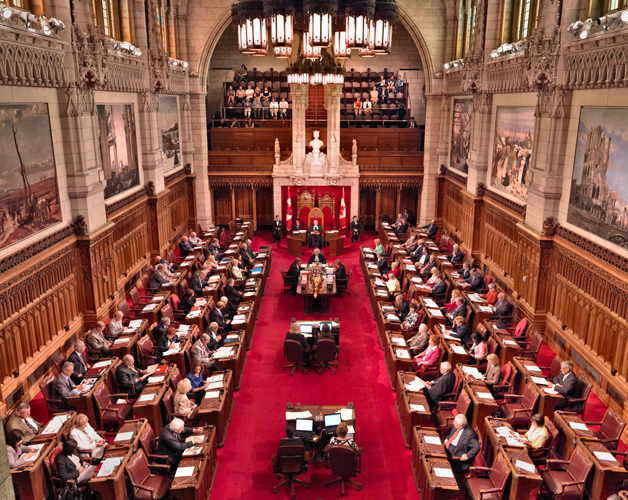MANITOULIN—The federal government has given First Nations until the end of November to comply with new transparency rules that came into effect last week, or risk losing government funding.
“I think this is another of these knee jerk reactions by the (Stephen) Harper government,” stated Patrick Madahbee, grand council chief of the Anishinaabek Nation, last week. “The Auditor General has already said First Nations people are one of the most financially recorded groups in Canada.”
Chief Madahbee explained the First Nations Financial Transparency Act, which requires that all bands post online their audited financial statements of the last fiscal year, including the salaries and expenses of their chiefs and councillors, comes because the Canadian Taxpayers Federation had called for it due to the federal government being billions of dollars in debt.
“And yes, there have been cases of inappropriateness, but for example in the case of Ron Giesbrecht, chief of the Kwikwetiem First Nation in British Columbia (who has been reported to earn nearly $1 million last year), his salary was actually $84,800, but he had negotiated a fee so that if he brought in millions of dollars in contracts to benefit the community he would get a bonus and in this case he did,” said Chief Madahbee. “He said he would resign if his community members felt there was a problem, but they won’t let him quit politics because he was helping the community by bringing in these development projects.”
“Politics has changed quite a bit for First Nations communities over the years,” said Chief Madahbee. “Chiefs would just focus on the community and its development internally, but this has changed to having to be global. When you are negotiating for a water treatment plant that costs $12 million dollars you need someone who is skilled in this type of negotiation or you’re only going to receive chump change.”
“Chiefs and band councils need to know where to get money for these type of projects,” said Chief Madahbee.
The federal government should take care of its own backyard before putting in place measures under the First Nations Financial Transparency Act, says Glen Hare, deputy grand chief of the Anishinabek Nation.
“As I’ve said before, this whole thing has to start in Ottawa,” stated Deputy Chief Hare. “If anyone wants to ask me what I make I’m open to telling them. The government makes such a big thing of First Nation finances, but the government itself has a horrible record of accountability and financial responsibility. They should clean up their act before they start looking at anyone else.”
As of Tuesday of last week, in accordance with the First Nations Financial Transparency Act First Nations chiefs and councillors salaries are now to be published on the Internet.
“First Nations, like all Canadians, deserve transparency and accountability from their elected officials,” said Bernard Valcourt, Minister of Aboriginal Affairs and Northern Development, said in a release on July 25. “That is why the government of Canada introduced the First Nations Financial Transparency Act, which received Royal Assent in 2013. This act is one example of how our government is taking action to ensure First Nations have access to information detailing how public funds are spent in their communities. It also is a further step in our commitment to encourage transparency and accountability in First Nations governance, and does not increase reporting requirements.”
Mr. Valcourt said July 29, 2014 would mark another important date on the road toward the goal of improved governance. In accordance with the First Nations Financial Transparency Act, First Nations defined as Indian Bands under the Indian Act are now required to publish their audited consolidated financial statements and schedules of remuneration and expenses of chiefs and councillors on the Internet. This is consistent with generally accepted accounting rules that already apply to government-owned businesses across Canada, and reporting requirements for Members of Parliament under the Parliament of Canada Act and the Salaries Act, he explained.
“We need to educate people on what is going on in our country,” said Deputy Chief Hare. “It is not a case of not managing money carefully in our First Nations. When people hear third party they think First Nations people are doing something wrong. For First Nations this is so degrading. I would like to see the federal government clean up their own dam act before they put these rules and regulations in place for our people. The only time we have run into financial troubles is when the government doesn’t provide First Nations the funds they had already been committed to.”
Last week, Mr. Valcourt announced that First Nations bands have until the end of November to comply with the new transparency laws or risk losing government funding. First Nations bands that refuse to post their financial statements online could also be subject to a court order forcing them to comply with the Transparency Act.
The disclosures posted online have revealed that Chief Giesbrecht earned nearly $1 million last year. His salary was $84,800 but he received a bonus of $800,000 stemming for a land deal with the BC government. His contract has since been renegotiated and the bonus removed.
It has been reported by CBC News that the department has posted the financial documents for 184 First Nations bands and will continue to post the audited statements as they receive them. The statements for another 40 First Nations will be posted shortly, as soon as department officials are finished reviewing the information sent to them. It is unclear how many of the more than 600 First Nations in Canada have complied with the new rules.
First Nations already have to produce their financial statements as part of their funding agreements with the federal government, but under the new law this is the first time they are being asked to post the information online.





